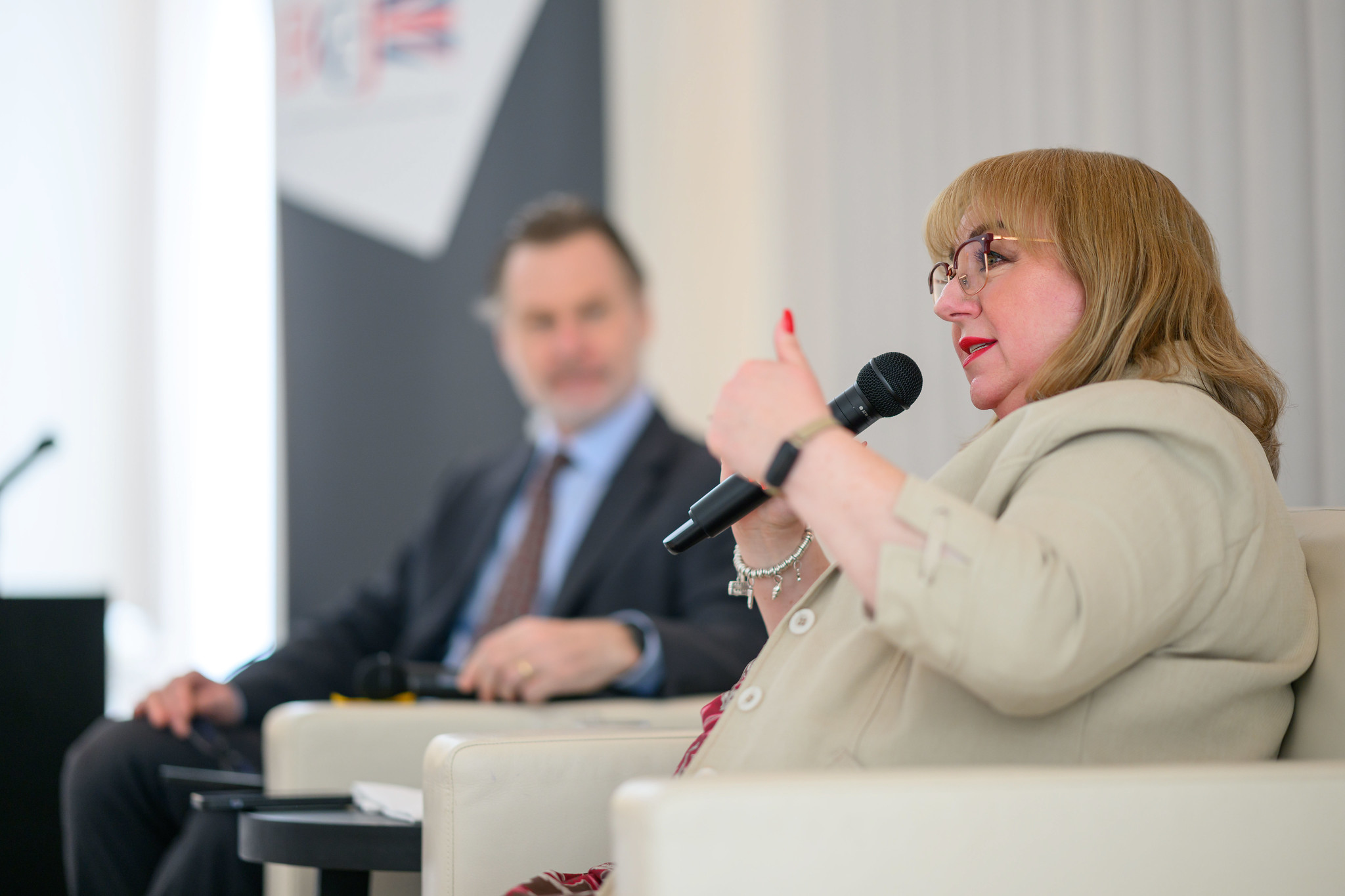BCCJ Breakfast Club: New UK Trade Envoy For Japan
When appointed UK Trade Envoy for Japan in January 2025, Sharon Hodgson MP committed to “championing UK businesses in Japan and boosting opportunities for them.”
And, with a number of Japanese companies in her constituency—including lithium-ion battery manufacturer AESC, automotive parts developer Faltec, machinery manufacturer Komatsu and automobile manufacturer Nissan—the MP for Washington and Gateshead South has also vowed to work with Japanese counterparts to “overcome any barriers to economic opportunities.”
The UK and Japan, she added, “have a lot to gain from improving trade relations.”
In May, Hodgson arrived in Japan for her inaugural visit, which featured high-profile meetings and a visit to the UK Pavilion at Expo 2025, Osaka, Kansai to celebrate the UK National Day.
While in Tokyo, she kickstarted the return of the BCCJ Breakfast Club by joining a fireside chat with BCCJ President Richard Lyle. She shared insights into current priorities for UK–Japan economic cooperation and explored practical ways in which businesses can tap into emerging opportunities in bilateral trade and investment.
Significant opportunities
Hodgson explained that Japan “aligns with all eight” of the priority growth sectors identified by the UK government in its upcoming industrial strategy, namely advanced manufacturing; clean energy industries; creative industries; defence, digital and technology; financial services, life sciences; and professional and business services. The strategy aims to boost these sectors to drive economic growth and create jobs.
Japan is the UK’s 15th largest trading partner. Total trade in goods and services between the two countries exceeded £30 billion in 2024, with the UK running a slight trade surplus, according to the UK Department for Business & Trade.
However, Japan investment into the UK heavily outweighs UK investment the other way, with the outward stock of UK investment in Japan totalling £3.2 billion compared to Japan’s £86.5 billion invested in the UK.
Japanese investment in the UK
The UK Trade Envoy stressed the importance of Japanese investment not only for the North East region of England but for the UK as a whole.
“There are 6,000 direct jobs at Nissan [there], 30,000 in the supply chain, and a further 1,000 at Nissan’s Research and Development Site [in Bedfordshire],” she said.
“But it’s not just Nissan – we’ve got Rolls Royce based in my constituency, as well as BAE Systems, Komatsu, Hitachi and AESC.
“We recently had [UK Chancellor of the Exchequer] Rachel Reeves visit Nissan and AESC to welcome a billion-pound investment—one-third private and two-thirds government and national wealth fund money—which will create another 1,000 jobs,” she added.
The investment will fund the establishment of a second AESC gigafactory in Sunderland, which is expected to provide batteries for up to 100,000 of Nissan’s electric vehicles annually.
“There are already 400 jobs at AESC, and this second gigafactory will add another 1,000 … All these supply chain jobs continue to emerge because Nissan was the catalyst. Almost everyone in Sunderland and across the North East knows someone who works for Nissan or its supply chain. The regeneration of the North East and the car industry there is all thanks to Nissan.
“We remain extremely focused within government on supporting Nissan and these large industries. The Secretary of State, Jonathan Reynolds, is from Sunderland, so there’s no one more committed to ensuring a supportive climate for Nissan and other key industries that the entire country relies upon.”
Bilateral and global relations
Hodgson stressed the importance of relationships and cultural similarities in ensuring a successful UK–Japan partnership.
“It has to be about more than just the bottom line; it must involve relationships, synergy and culture as well. There’s considerable synergy between how companies operate in the UK and how companies work here in Japan,” she said.
She added that the UK government, like the Japanese government, has worked hard to “remain calm” amid the market turmoil caused by the Trump administration’s “Liberation Day” tariffs.
“Our government demonstrated that we weren’t going to panic, and Japan didn’t panic either. Indeed, Japan quickly dispatched a team to meet with Trump’s representatives to address those tariffs. It’s a different world now, and we all need to remain calm and play our part,” she said.
Employment and immigration
Asked about the future of the UK workforce amid the artificial intelligence revolution, she said the UK would remain a “mixed economy” with a range of new jobs involving robotics.
“When I go into schools, I often tell the students that many of the jobs they’ll have in the future don’t even exist yet. You can see how exciting that is for them as they try to imagine what they might do,” she said.
“Right now, I believe there’s still a strong future for manufacturing jobs, but these roles will increasingly involve robotics. For example, I’ve seen production lines at Nissan transition from entirely manual to incorporating more robotics—this trend will likely continue.”
Asked about immigration policy, Hodgson said the government aims to ensure the UK continues to attract skilled workers, while also encouraging economically inactive people back into the workforce.
“Many of you here are not originally from Japan and have come to work here,” she said, addressing the event attendees. This demonstrates that migration for employment is a global norm and will likely always be the case, so it’s crucial we manage it effectively. The debate on whether we’re managing it correctly remains alive and is the 64 million dollar question.”

